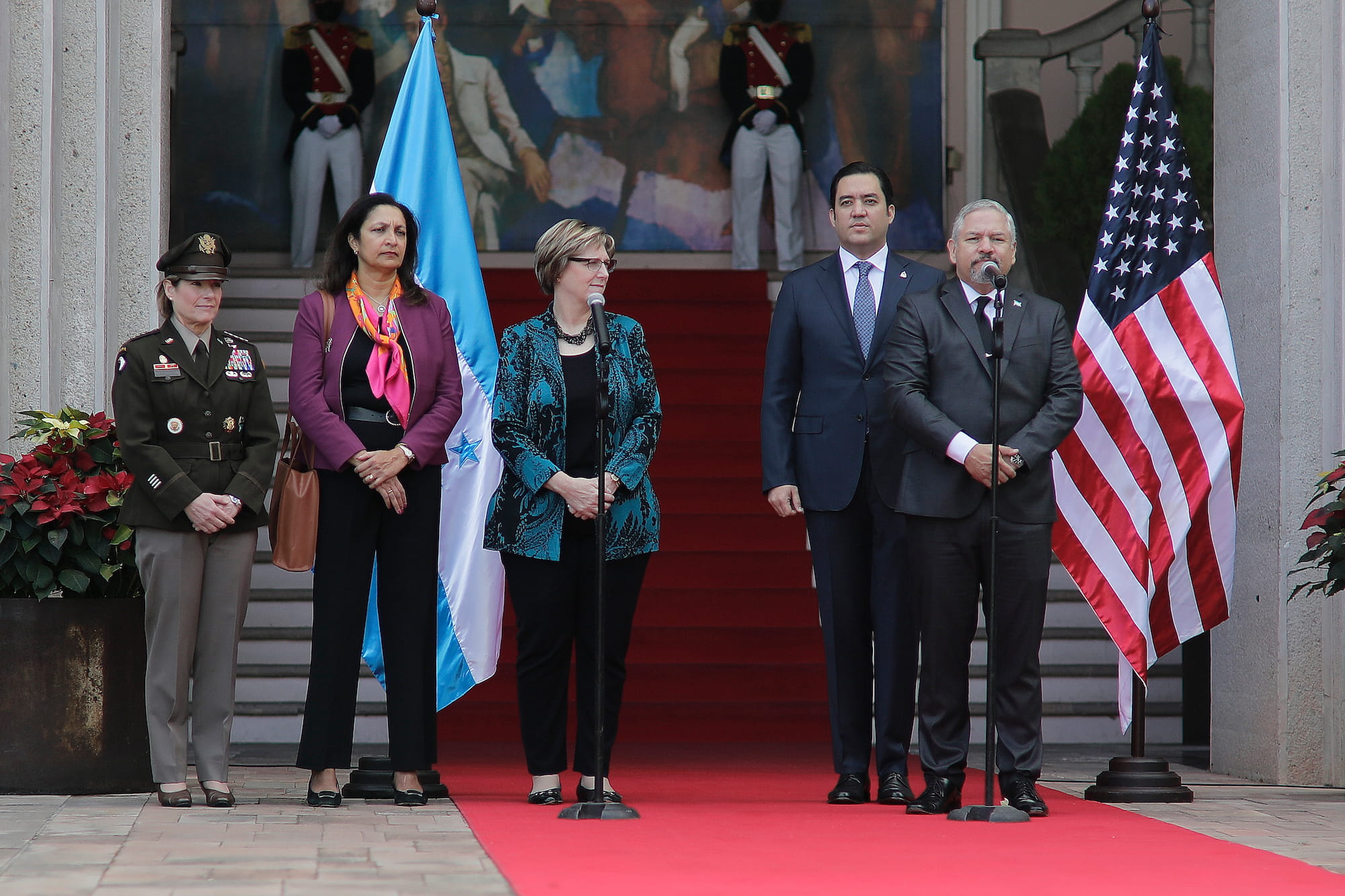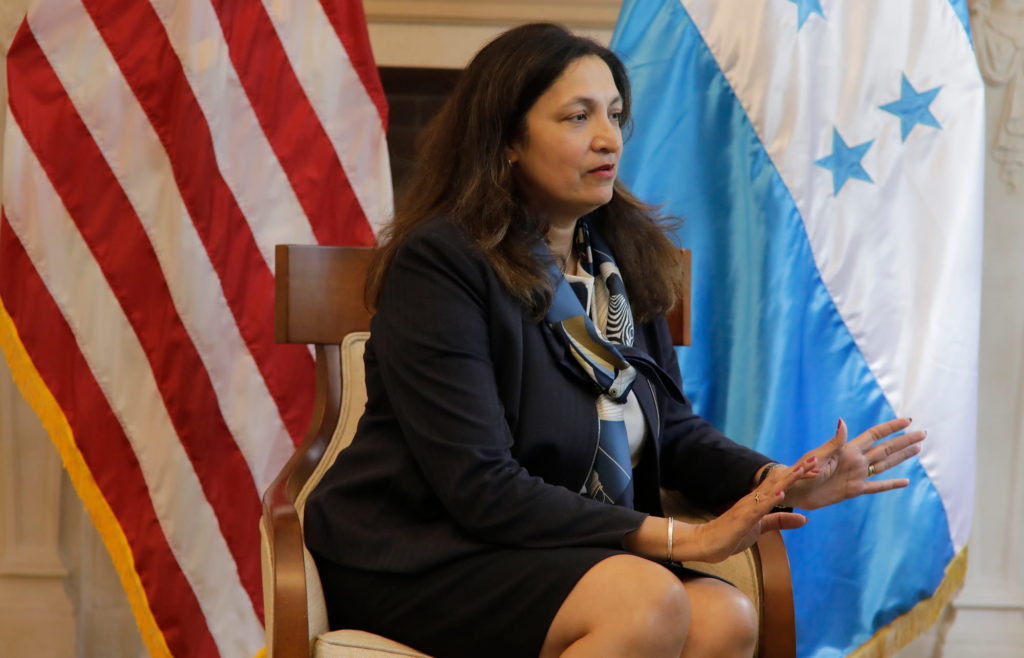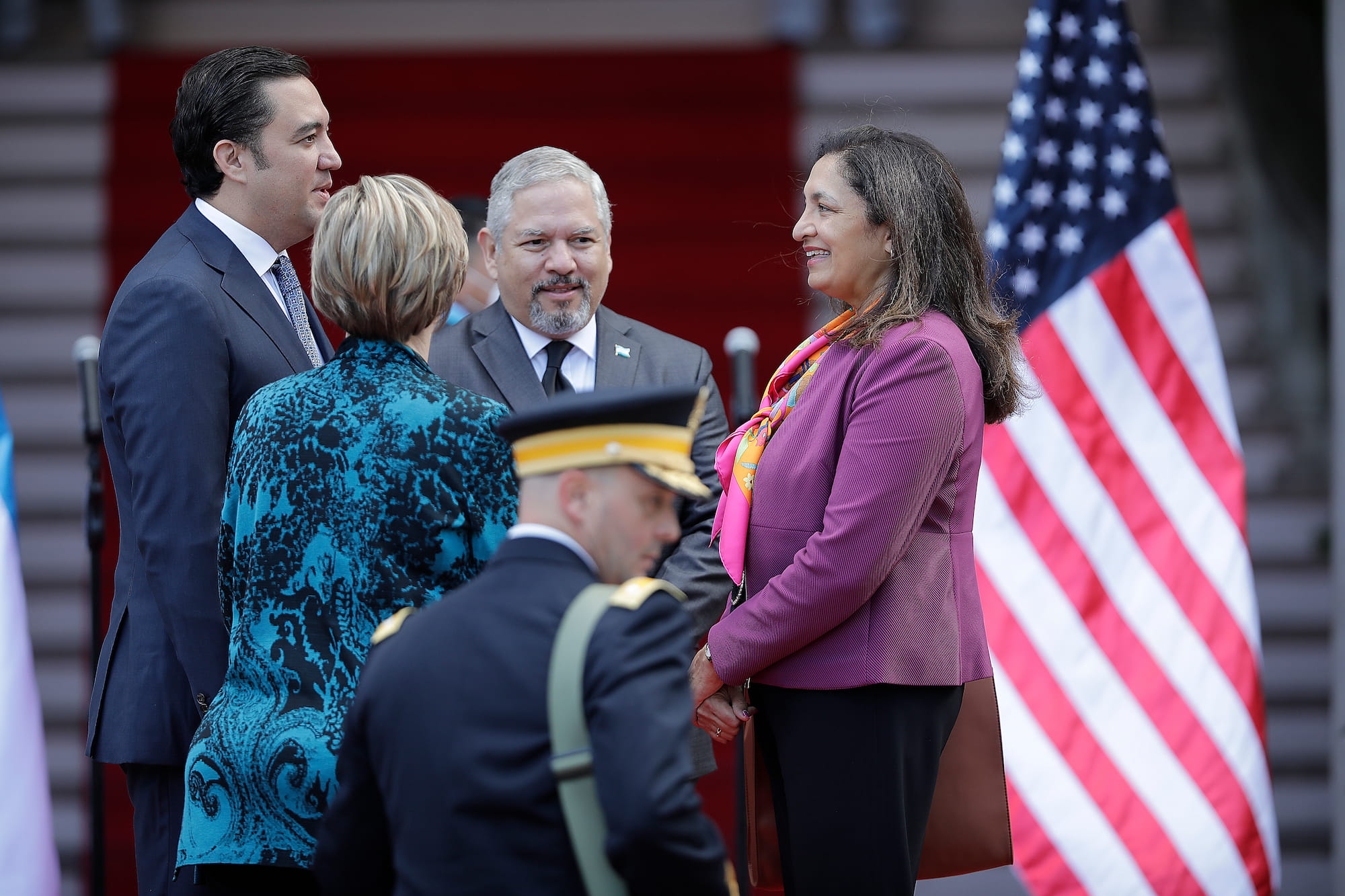Text: Jennifer Avila
Photo: Jorge Cabrera
Uzra Zeya, Under Secretary of State for Civilian Security, Democracy and Human Rights of the United States government, visited Honduras from January 9-12, 2023 leading a delegation of high-level officials to hold the second bilateral dialogue so far in the government of Xiomara Castro.
In an exclusive interview for Contracorriente (CC), Undersecretary Uzra Zeya (UZ) spoke about her government’s support to Honduras on issues of education, security, migration and human rights and about the conditions of the United States to support the installation of an International Commission against Corruption and Impunity in Honduras (CICIH) to strengthen the anti-corruption efforts in the country.
This visit coincided with the extension of the state of exception decreed by the Executive Branch on December 3, 2022, which now covers 17 departments of the country. Although the U.S. government has been a major donor to the Honduran National Police and Armed Forces, Zeya said his government is not involved in the implementation of the state of exception and that U.S. support for the security forces is conditioned by respect for the fundamental rights of citizens.
“States of exception, in general, are difficult to sustain and we are focused on providing support to the security system, but always anchored in respect for human rights. We are not involved in the application of the state of exception but we are supporting Honduran police and defense forces that respect human rights and we have a very strong commitment to strengthening the capacities and efforts of these objectives,” she said.
In the middle of the state of exception, last weekend two environmentalists were murdered in the community of Guapinol in Tocoa, northern Honduras. This crime was discussed in the bilateral dialogue in which, according to the undersecretary, they urged the Honduran government to promote a prompt and effective investigation to clarify this fact and increase protection for human rights defenders, environmentalists, land defenders, and LGTBIQ+ people.
Under Secretary Uzra Zeya also said that the U.S. government will support civil society organizations that play an important role in the fight against corruption, the fight against gender-based violence, and the protection of vulnerable populations.
CC: How do you evaluate the relationship between the US government and the government of Xiomara Castro in this first year?
UZ: I think that my visit to Honduras, my second visit in a little more than a year, leading a very large and robust interagency delegation for our second strategic dialogue reflects the commitment of the White House for strengthening and deepening our strategic partnership to Honduras, if you have seen in the joint statement that we released yesterday, at the end of several hours of meetings we committed to working together to deliver for the Honduran people in areas such as governance, human rights, including protection for human rights defenders, fighting corruption, supporting civilian security, the rule of law, combating gender-based violence, it was an incredibly wide-ranging and deep discussion and after this series of meetings we have a shared commitment to move forward in this areas.
CC: What risks does this government face in the regional context marked by an authoritarian populist tendency? ¿Could Honduras join this authoritarian wave?
UZ: The United States, certainly is concerned by some significant instances of democratic backsliding throughout the region and as President Biden and Secretary Blinken have said multiple times, no democracy is perfect, but we believe that democracy as a system is best placed to deliver and address 21st-century problems. President Biden also has really advanced the idea of the United States helping strengthened democracies around the world, and their ability to deliver to all their citizens. I think this spirit was very much behind this second strategic dialogue that took place yesterday.
I also know that this dialogue included a human rights dialogue and the manifestation of our joint action was well represented today. I was heartened to attend the launch of a new educational alliance partnership that will focus on supporting basic education and involve the ministries of education, foreign affairs, and infrastructure, we have COHEP represented as a partner as well, the government of Taiwan has joined this multistate partnership and the United States is committed to Invest 33 million dollars towards the improvement of basic schools infrastructure in a country where out of every 10 children who enter school at a primary level only two graduate from high school. This partnership is involved in translating the words into action in order to strengthen Honduras’ ability to deliver for all its citizens and most importantly a brighter future for the boys and girls who are in fact the future of this wonderful nation.

CC: What are the United States’ main concerns in regard to the fight against corruption in Honduras?
UZ: Fighting corruption is a very elevated foreign policy priority for the Biden administration worldwide, just a little over a year ago we put forward our first national security memorandum on fighting corruption, elevating it as a core national priority. So certainly anti-corruption was a major topic of discussion in the human righ3ts dialogues and specifically, we would like to see Honduras move forward swiftly to finalize an agreement with the United Nations on the establishment of CICIH, (International Commission on Combating Corruption and Impunity in Honduras) and we would like to see it as an independent, impartial and autonomous body. As the leading international donor to Honduras’ economy and security, we are investing a great deal in the fight against corruption through USAID and the State Department. This is really occurring at all levels, helping build more responsive institutions that can stay ahead of corrupt actors and international criminals and their methods but is also supporting civil society and free and independent media which we believe are indispensable actors in the fight against corruption internationally.
CC: What are the conditions under which the US government will support the installation of an international commission against corruption and impunity in Honduras?
UZ: We welcomed the signing of a memorandum between the United Nations and Honduras last December, but I know this is just the first step, we would like to see as soon as possible the arrival of the UN technical team that will move this process forward and we look forward to the recommendations with respect to legal reforms that will be necessary to make such a body possible. But, as I mentioned, the fight against corruption is really multidimensional so we are committed in terms of supporting anti-corruption policies to continuing to support the development of the government’s capacity to fight kleptocracy. We have already been successful in a joint effort to pursue a major corruption case that will result in the return of one million dollars to Honduras from confiscated assets. We look forwards to finalizing the memorandum of the case in order to make the transfer possible. This is just one example of what this effort means and what needs to be done, to work with the government and civil society in these efforts.
CC: The security challenges remain in Honduras. The government has decreed a state of exception with the participation of the military police and the national police. How will the United States support the Armed Forces and the police in this context? What controls will there be on the funds invested in security?
UZ: I will say, with respect to the state of exception, that this did come up in our discussions with Honduran counterparts and we have generally seen that it is possible to address and recognize those security challenges while upholding fundamental human rights. States of exception, in general, are difficult to sustain and we are focused on supporting the Honduran security system in a way that is anchored to upholding human rights. We are not involved in the enforcement of the state of exception but we are certainly supporting Honduran police and defense forces that respect human rights, we have an unwavering commitment to strengthening the capacity and efforts to secure those objectives.
CC: In Honduras there is a combination of massive population expulsion and transit of large groups of transcontinental migrants and refugees (Venezuela, Nicaragua, Haiti, and other countries including several from Africa) and also migrants returning from the United States. What are the strategies on this issue?
UZ: We are seeing globally a historic peak in forced displacement due to a number of factors: climate change, community gender-based violence, toxic governance and the disruptions caused by the global pandemic. The Western Hemisphere is considered responsible for 25% of 100 million civilians displaced internationally, this is an important topic of engagement and cooperation between the U.S. and Honduras and we welcomed Honduras’ active participation in the Los Angeles declaration on migrant protection that was launched last June at the Democracy Summit of the Americas.
This declaration advances a vision of shared responsibility in ensuring safe, orderly, and humane migration throughout this hemisphere; Honduras is taking an important step in adopting legislation for internally displaced people. This was a topic of discussion yesterday and we certainly welcome efforts to devote more resources and protection to these vulnerable internally displaced populations.
I would also note that last year, we recognized this challenge Honduras is facing, so we provided $55 million in humanitarian assistance to Honduras specifically on the issue you mention with respect to the transit of record numbers of third-country nationals, and vulnerable populations needing protection.
Also the recent announcement by the [U.S.] administration on the extension of legal pathways for Venezuelans, Cubans, Nicaraguans, and Haitians, we hope will mitigate the flow of this record number of individuals migrating irregularly which themselves are subject to exploitation and various dangers.
CC: Is the safe third-country policy still in force in the new administration?
UZ: This is from the previous administration, it is not what I am referring to right now. At the moment, we are supporting the capacity of countries to receive people, increase protection for individuals in transit which includes screening and efforts to increase protection capacity, that specific countries increase legal pathways, which is something that countries like Colombia, Ecuador or partners like Canada, Spain and the United States have done, and increasing our collective efforts in humanitarian response and this in the framework of guaranteeing orderly and safe migration.
CC: Finally, this weekend two environmentalists were murdered in northern Honduras, we have an important challenge regarding the protection of environmental defenders and human rights defenders. What is your opinion on this issue and what were the agreements in the dialogue you had with the new government regarding the protection of these actors?
UZ: I want to express our deepest condolences with respect to these tragic deaths, murders of these two environmental activists. This is emblematic of a broader problem with respect to the unacceptable danger that environmental defenders have faced globally, and the specific problem here in Honduras; so we did raise this issue in our dialogues and we have called on the government to launch a swift and thorough investigation into these latest incidents. The issue of increasing the protection for human rights defenders, environmental and land activists, and indigenous and LGBTQI+ people is an ongoing priority for our human rights engagement in Honduras, certainly, we would agree that more things need to be done.







